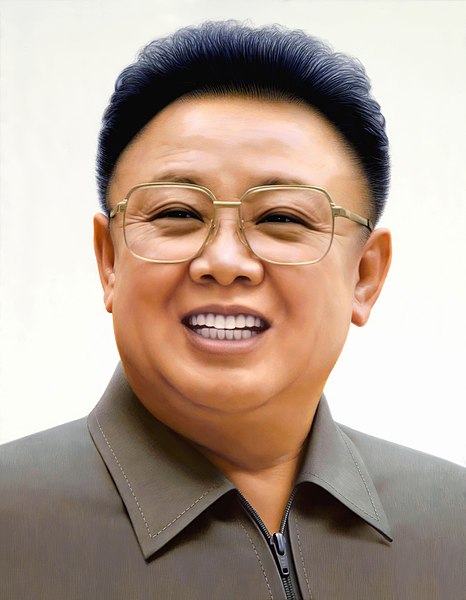So I found one of my old university textbooks for an economics course I had taken, and of course I had to jump to the section of the book that goes in Marxism. To the surprise of no one, it hand-picks the bare minimum of what Marx wrote on, generously slathers on bad-faith arguments to de-legitimatize Marxism, and makes shit up on the fly to suite the author’s narrative.
For the morbidly curious, here’s the section the author thinks proves us evil commies wrong.
Chapter 6: It’s A Macroeconomic Jungle Out There!
Swinging to the Far Left: Malthus, Neo-Malthusians, Marx-Engels, and Neo-Marxians
The general optimism about capitalism found in the Wealth of Nations soon came under attack, most notably by Thomas Malthus in An Essay on the Principle of Population, As It Affects the Future Improvement of Society (1798). This work was first published anonymously for fear of reprisals. Malthus too accepted the labor theory of value and a gold standard. However, unlike the disciples of the Classical School, Malthus rejected Say’s Law of Markets and felt that prolonged oversaving was possible.
Malthus perceived unrestrained sexual activity of the human race, the so-called “passion between the sexes”. Population growth will inevitably outstrip economic growth in the long run because societies are characterized by the Iron Law of Wages. Further division and specialization of labor won’t be enough to offset the surplus supply of people. Free trade makes the situation worst for the masses by causing more rapid population growth. Wages will eventually settle at subsistence levels - it’s cast in iron!
In the famous Corn Law debates in 1815, Malthus argued for government tariffs (price floors) on imported corn and grains. He felt that England could only support so many people above poverty levels. In addition, higher corn prices signal a better standard of living, and so they lead to slower population growth. Ricardo challenged the Malthusian perspective immediately with the notion of comparative advantage in defense of free trade. Even so the Corn Laws were passed in 1815 and not repealed until 1846.
For the following 100 years, Malthusian population theory was pushed aside by mainstream economists due to the obvious marked improvements in living standards in western societies. However, in the later 1960’s a revival of neo-Malthusian thought occurred. The biologist Paul Ehrlich of Stanford authored of The Population Bomb (1970), decrying a tragedy of the commons taking place globally. He called for the first Earth Day at this time. Similarly, Jay Forrester and Dennis Meadows of MIT plus the Club of Rome developed neo-Malthusian computer models in the early 1970’s that predicted dire shortages of major raw materials like oil and natural gas and global catastrophe within fifty years due to overpopulation. The world was beyond its optimum carrying capacity!
Karl Marx, along with his close friend and corroborator Friedrich Engels, took the attacks on capitalism well beyond Malthus and overpopulation. First in the Communist Manifesto in 1848, and then in Das Kapital in 1867, they railed against labor exploitation, not overpopulation, as the primary reason for the misery of the working class. They considered Malthusian thinking a “vile and infamous doctrine, a repulsive blasphemy against man and nature”. Instead, science clearly demonstrated that human progress can outstrip population growth if labor exploitation can be avoided. Darwin’s The Origin of Species appeared in 1859, and it had a profound effect on Marx and Engels. Just as species evolve, so do economic systems they reasoned. Therefore, there can eventually be one big happy “community” on earth.
Marxian doctrine depends most critically on a labor theory of value (even though Marx really knew that market prices were not determined by labor content). It concludes that all countries must evolve in a series of well-defined stages.
Chaos is the initial state of the world, followed by tribal societies, in which the means of production and the products of labor are collectively owned and equally shared by the group (this won’t occur again until the last stage says Marx). Next are slave-owning societies, where the means of production (slave and land) are privately owned by the masters.
Eventually comes feudalism, in which kings and queens and their nobles are the principal owners of property. Feudalism imposes order on the chaos of smaller societies, but its inherent contradiction is to be too rigid socially. Status at birth remains fixed over time. So here comes capitalism, where the means of production (the factories, the land, the banks) may be widely owned at first.
Indeed the early stages of laissez-faire capitalism are just as Smith described. Division and specialization of labor create significant improvements in productivity, and free trade improves living standards for many people. No system is more efficient at allocating a society’s scarce resources than the laissez-faire capitalism.
However, Marx and Engels go on to draw a sharp dichotomy between the capitalists, or bourgeoisie, and the workers, or proletariat. The proletariat appreciate laissez-faire competition and free trade because of the consumption benefits being bestowed. In contrast, the bourgeoisie despise the constant struggle for profits and survival-of-the-fittest mentality. Over time, collusion, lobbying efforts, takeovers, and other such monopolist tendencies arise.
According to the doctrine, the capitalists are driven by a desire to maintain their rate of return as they invest in new capital plant and equipment. Additional investment, ceteris paribus, causes the rate of return to fall due to diminishing returns to capital. This process further intensifies monopoly power as weaker firms fall by the wayside. Ultimately, monopolists dominate the economic landscape rather than laissez-faire competition.
The new capital investment is argued to be labor saving. This means that machines keep replacing workers, causing more involuntary unemployment. A large “reserve army of unemployed” develops that is comprised of workers who want to work but can’t find meaningful jobs. Surplus labor is everywhere. Striving to maintain their rates of return, monopoly capitalists readily exploit their workers by taking advantage this surplus to hold down wages.
In addition, they use their monopoly power to charge monopoly prices. Goods accumulate on store shelves that the masses can’t buy. Workers, the true source of value, are underpaid. Tiny Tim is looking in the window, but the goods are beyond his reach. It just isn’t fair!
The monopoly capitalism stage persists until the exploitation becomes so demeaning that the workers throw off their chains, ignite a revolution, and take over the means of production. The stage of socialism ensues. The established government is thrown out in one fell swoop since the state has been the device controlled by the bourgeoisie to advance its own interest. Democracy in the bourgeois state is viewed as a complete sham. The proletariat seizes power at this catastrophic, yet opportune moment, and the established government dissolves. The proletariat forms its own dictatorship and “crushes all capitalist employers along with their distorted class ideology”. This stage of socialism is also the beginning of communism.
In the distant future, the time will come when this proletarian state and its agencies of oppression will wither away according to Marxian doctrine. A new communal psychology arises in which each person is motivated to contribute to the common effort (“from each according to his abilities”) and consume only what is necessary (“to each according to his needs”). This second stage is called full communism, a world that needs no government because of the abundance of wealth. It is a world in perfect harmony and peace. How paradoxical that “communism” has come to mean complete, totalitarian, government control. Marx defined it as just the opposite.
Marx and Engels readily accepted a gold standard as necessary for exchange. However, they saw the banking and credit system as much of the problem with capitalism. The development and refinement of the financial industry accelerates the concentration of monopoly power and heightens the influence of the bourgeoisie. Banks become tools of the capitalists to exploit the workers. Therefore, the financial system has to be “socialized” in the revolution of the proletariat. Credit must be rationed by the state. It must be lent to carefully chosen sectors of the economy at interest rates far below market values (even zero). Redistribution of income from capital to labor becomes one of the highest priorities of the state so that all workers receive their true productive value.
What a story! Greed and exploitation are intertwined with disequilibrium and chaos. Overabundance of wealth is only enjoyed by an extreme minority in advance capitalism. Willing workers suffer at the expense of machines. An enlightened few must become the saviors of the masses. Social perfection on earth is the ultimate goal. Religion is scorned as the “opiate of the masses.”
We all know that Marxian leaders like Lenin, Stalin, and Chairman Mao Zedong have bent these ideas to their own dementia. The clear outcome of Marxian doctrine, when applied in the political arena, has been the mass exploitation and suffering that Marx himself condemned. Perhaps Marx anticipated such turmoil when, on his deathbed, he said, “I am not a Marxist!”
The radical left of today clings to the belief that if the social evils of capitalism are eliminated, the true and wonderful nature of the human race will blossom. Religious thought is irrational. Concentrate instead on the secular world, and use applied science to determine exploitation and the means to manage it.
In the 1940’s and 1950’s, neo-Marxian economists like Oskar Lange and Paul Sweezy (of kinked demand curve fame) tried to advance Marx-Engels ideology in the U.S. But even with the swing left in the economics profession after World War II, they faced opposition to their harsh anti-Marshallian micro viewpoint. A minor revival of Marxian macro dynamics occurred in the 1960’s and early 1970’s but since the 1980’s, the Marxians, like Malthusians, have been on the run in the economics profession. The basic belief that there are excess supplies of worker and that the human race is doomed in its present stage because of “evil” emotions and actions sells far better among sociologists, anthropologists, and political scientists.
Keep in mind that even though the far left thinkers say they are driven by the desire to improve life for the masses, their prescriptions inevitably assume that the masses are foolish as a group. Either they overproduce offspring or they let themselves be exploited. So it is up to highly-trained, far-sighted individuals, who must outguess markets, to manage the system and people properly. What’s there left to do?
The clear outcome of Marxian doctrine, when applied in the political arena, has been the mass exploitation and suffering that Marx himself condemned.
What? How? The living standards for Soviet workers increased rapidly since the 1940s, a development that would have been pretty unlikely in an economy that followed the law of value and prioritized individual profit.
Perhaps Marx anticipated such turmoil when, on his deathbed, he said, “I am not a Marxist!”
This is a mistake that would have been easy to leave unmade. His last words were ‘Go on, get out! Last words are for fools who haven’t said enough!’ The ‘I am not a Marxist’ dead horse was a reference to self‐identifying Marxists in France who promoted reformism.
I know that I only addressed a scrap of the misinformation, but I honestly don’t care enough to refute everything therein.
It’s an incoherent mess, I was just compelled to share my misfortune with lemmygrad when I found it (sorry lol). And I briefly thought of refuting all the shit he spewed, but honestly my time is better spent doing anything else!
We all know that Marxian leaders like Lenin, Stalin, and Chairman Mao Zedong have bent these ideas to their own dementia. The clear outcome of Marxian doctrine, when applied in the political arena, has been the mass exploitation and suffering that Marx himself condemned. Perhaps Marx anticipated such turmoil when, on his deathbed, he said, “I am not a Marxist!”

Has big “Darwin recanted evolution on his deathbed” energy. The more I look at anti-com arguments, the more they look exactly like creationist arguments against evolution.
Tbf Marx did actually say that (or at least Engels says he did, and I don’t see reason to doubt him), it just wasn’t on his deathbed and it was to dunk on people who claimed to follow his ideas
It’s unsurprising that Marx rejected the term “Marxist”. Similarly, Lenin rejected the term “Leninism”, Stalin rejected the term “Stalinism”, and Mao rejected the term “Maoism”.
If someone decided to name an ideology after me I would also probably not like that
I’m a Marxist-Leninist-NoGodsNoMastersist
Oh yeah, of course, he wasn’t a “Marxist,” he was a communist. “Marxism” doesn’t work on its own, Marx never laid out plans for a successful revolution. That’s why we have Marxism-Leninism, because Lenin took Marx’s theory and applied it to the real world to create successful praxis.
Entirely different context to “His deathbed confession was that he lied about all of it.” Though if there’s one thing anti-coms hate almost as much as communism, it’s context.
What a story! Whoever wrote this is right, there does need to be someone smarter to manage them properly. Otherwise they’ll end up publishing Reddit-tier analysis like this.
No system is more efficient at allocating a society’s scarce resources than the laissez-faire capitalism.
This is the part i stopped reading lol.
I disagree with that assessment. The author’s brain cells are a scarce resource and they are not being allocated efficiently.
He should donate that brain to a capitalist, he would know what to do with those resources!
That’s obviously because his brain is a planned economy. If he were anatomically capitalist he could write much better. 🤓
anatomically capitalist
Laissez-faire anatomy? Soooo, amoeba?
This talking point is so maddening. What do they even mean by “efficiency” in allocating resources? How do you measure that efficiency? What is the metric being optimized? Wasted resources? People unable to fulfill their needs? Do they think free market capitalism is good at minimizing these things? They do don’t they? Oh my god

Be right back, gonna check out US versus China economic statistics (and when was the last time China had a recession)
“Neo-Marxians”
What are they talking about?
Are they just trying to normalise neo-liberalism, and make it sound like every political philosophy has a “neo” version or something?
Just the abhorrent ones like Nazism and liberalism get neo versions
marxism got it right on the first try
nah we just keep adding names at the end when someone makes a breakthrough.
Because, unlike liberals, we can comprehend words of more than one syllable
imagine thinking Marxism is just an reinvention of Great Man Theory. Holy shit lmao
even with the swing left in the economics profession after World War II
Is there a McCarthy emoji?
there can eventually be one big happy “community” on earth
I mean, this does sound nice… I’m not opposed to the idea.
This is just incredible. Thanks for sharing
I’m interested who the author of this is. It’s wild how opinionated it gets.
This textbook was written by somebody who never made it past the first sentence of Das Kapital.
It concludes that all countries must evolve in a series of well-defined stages.
No it doesn’t. We recognize that different societies have different paths. Hunter gathering has jumped to capitalism and feudalism to socialism. Marx just studied England. By this logic every evolutionist must think all species will inevitably evolve into the same perfect species.
Marxian doctrine depends most critically on a labor theory of value (even though Marx really knew that market prices were not determined by labor content).
You admit that Marx acknowledged that, yet you don’t explain how he rationalized that fact.
I hate that the writer acts like Malthus, an elitist aristocrat was similar to Marx.
This reminds me of a graphic novel I read a while ago called ‘economic.’ It had an OK reformist critique of capitalism, but completely strawmanned Marxism. I remember there was a panel that was like “Karl Marx and Friedrich Engels wrote the Communist Manifesto. literal caricature of Karl Marx: dur dur dur, I think labor creates value look at how stupid I am.” I don’t even think it really tried to debunk it. Later there was a caricature of Stalin too. I’m glad I never took it to heart.
Edit: I looked up economix and the depiction of Marx isn’t as bad as I remember, but the author is still like “we don’t talk about labor theory of value any more so it must have been wrong.”
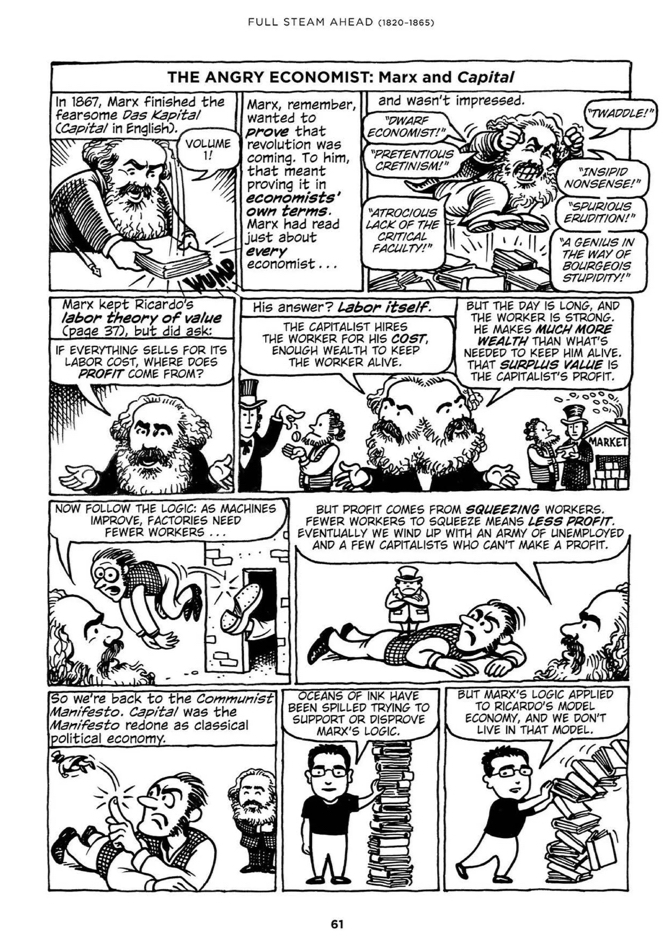
Here’s some more cringe:
spoiler
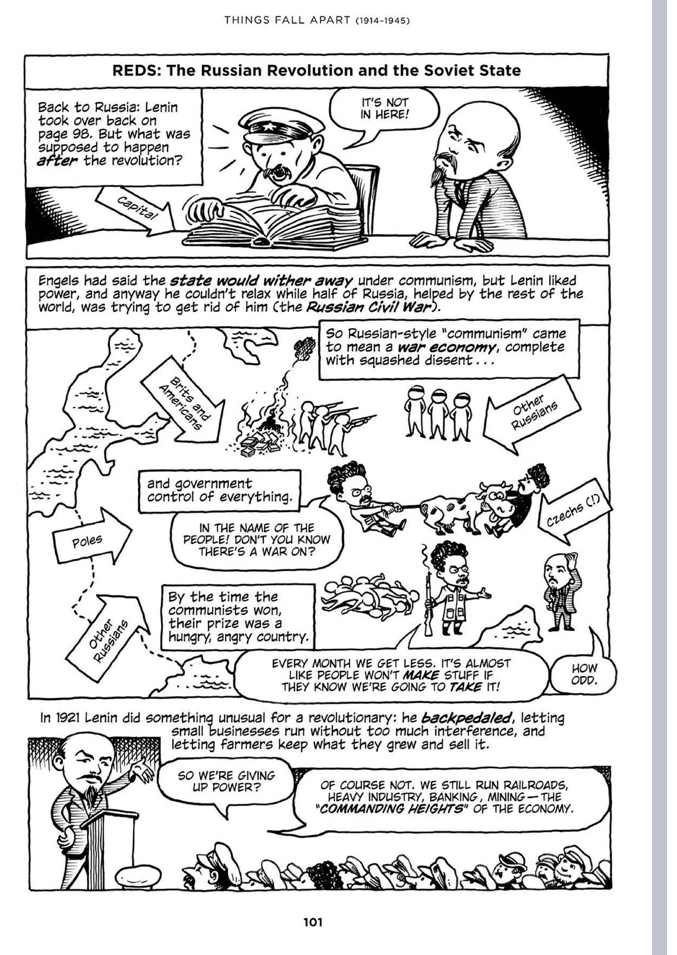
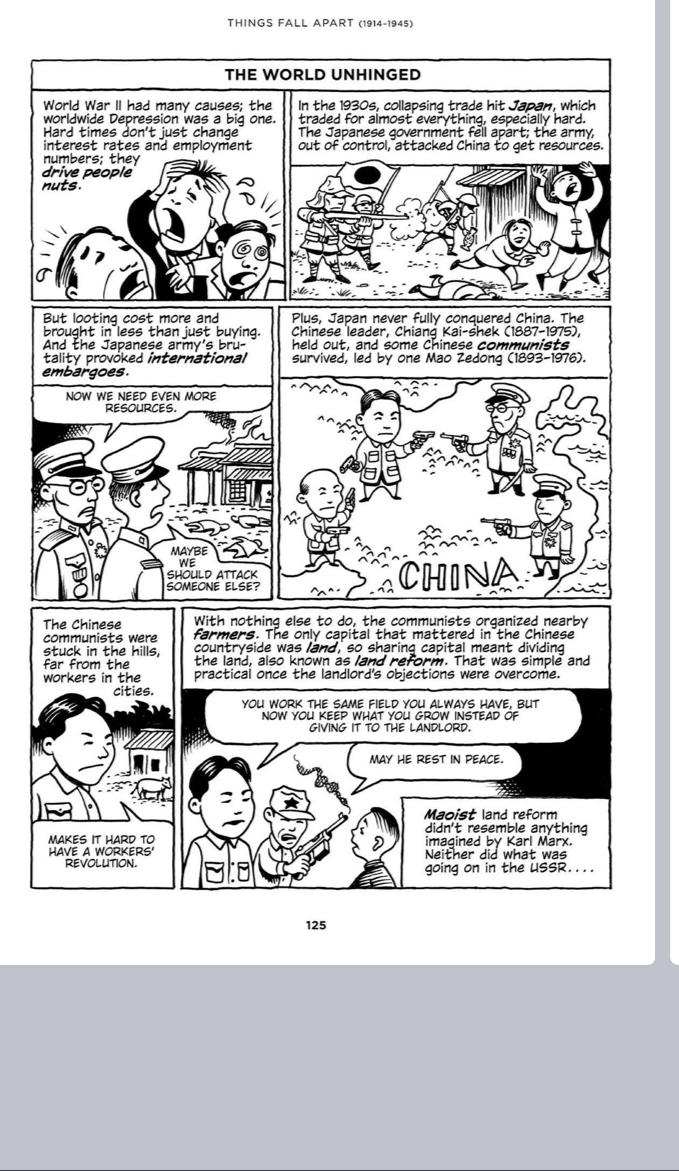
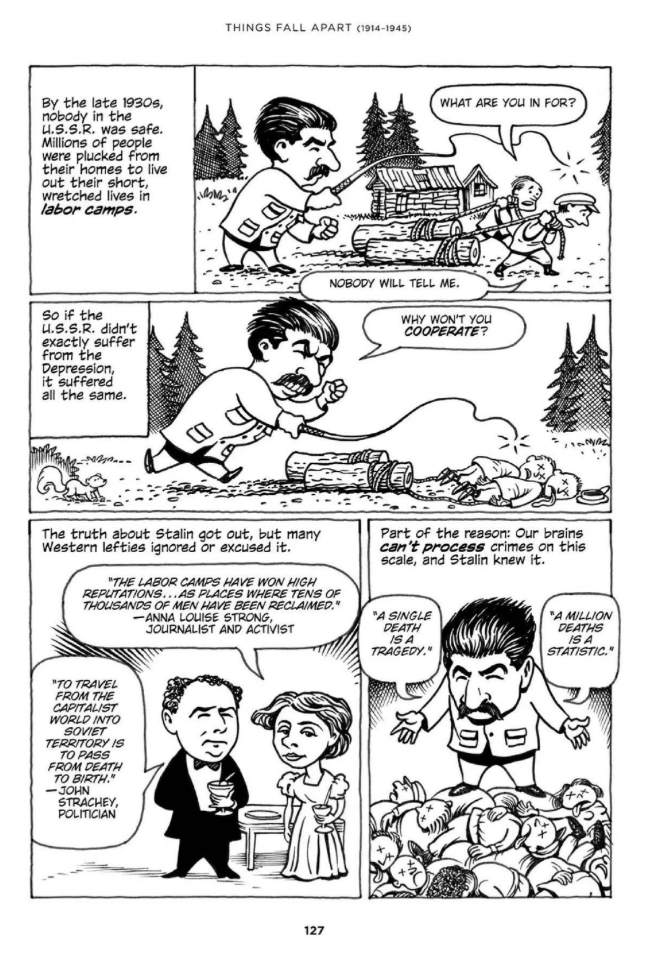
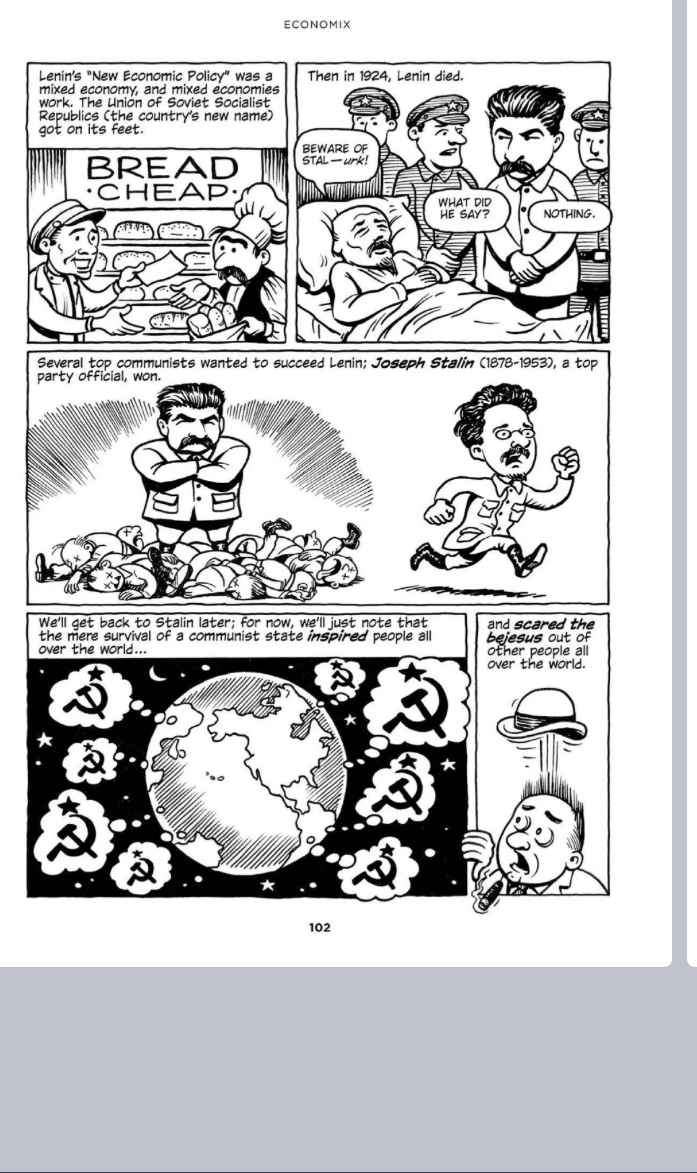

“The clear outcome of Marxian doctrine, when applied in the political arena, has been the mass exploitation and suffering that Marx himself condemned. Perhaps Marx anticipated such turmoil when, on his deathbed, he said, “I am not a Marxist!” sounds like CATO hands wrote this chapter












